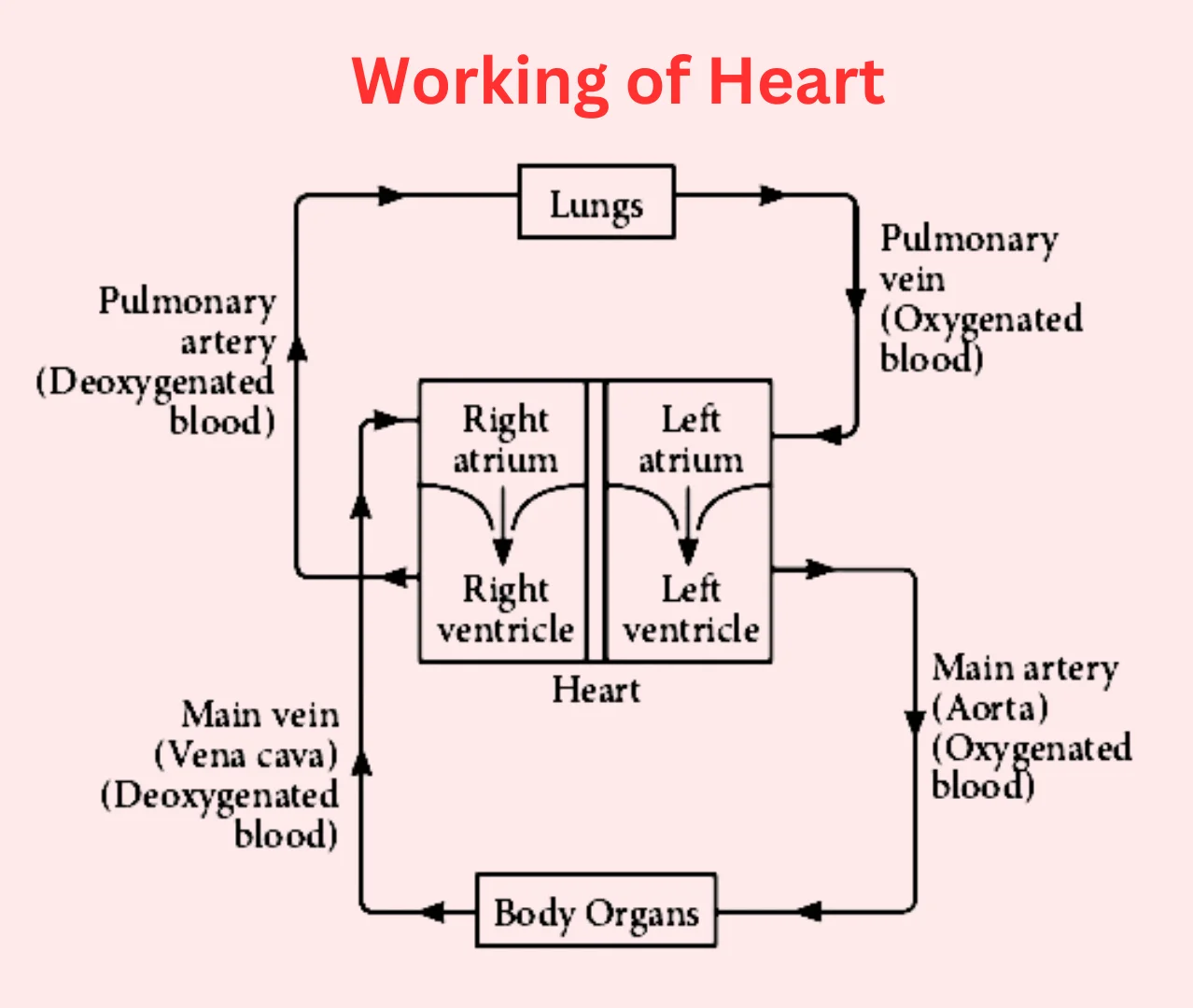How do cells communicate with each other?
The heart is a muscular organ that functions as the central component of the circulatory system, responsible for pumping blood throughout the body. Its primary role is to supply oxygen and nutrients to tissues and remove carbon dioxide and other metabolic wastes. The heart operates in a highly coordRead more
The heart is a muscular organ that functions as the central component of the circulatory system, responsible for pumping blood throughout the body. Its primary role is to supply oxygen and nutrients to tissues and remove carbon dioxide and other metabolic wastes. The heart operates in a highly coordinated manner, with distinct phases of contraction and relaxation. Here’s a detailed discussion on how the heart works:
Basic Structure of the Heart
The heart consists of four chambers:
- Right Atrium: Receives deoxygenated blood from the body through the superior and inferior vena cava.
- Right Ventricle: Pumps the deoxygenated blood to the lungs via the pulmonary artery for oxygenation.
- Left Atrium: Receives oxygenated blood from the lungs through the pulmonary veins.
- Left Ventricle: Pumps oxygen-rich blood to the rest of the body through the aorta.
The heart also contains several valves that control the flow of blood and prevent backflow:
- Tricuspid Valve: Between the right atrium and right ventricle.
- Pulmonary Valve: Between the right ventricle and the pulmonary artery.
- Mitral Valve: Between the left atrium and left ventricle.
- Aortic Valve: Between the left ventricle and the aorta.
How the Heart Works: The Cardiac Cycle
The heart works through a continuous cycle of contraction (systole) and relaxation (diastole). The cycle ensures that blood flows in the right direction and is efficiently pumped throughout the body.
- Atrial Contraction (Systole) and Ventricular Filling:
- The cycle begins with the atria (right and left) filling with blood coming from the body and lungs, respectively.
- The atrial muscles contract, pushing blood into the ventricles (right and left).
- This phase is known as atrial systole, and it completes the filling of the ventricles with blood.
- Ventricular Contraction (Systole):
- Once the ventricles are full, they begin to contract (ventricular systole).
- The tricuspid valve and mitral valve close to prevent blood from flowing back into the atria.
- As the ventricles contract, the pulmonary valve opens, allowing blood to flow from the right ventricle to the lungs via the pulmonary artery, where it gets oxygenated.
- The aortic valve opens, and blood is pumped from the left ventricle into the aorta, the largest artery, and then distributed throughout the body.
- Ventricular Relaxation (Diastole):
- After the ventricles pump out blood, they relax in a phase called ventricular diastole.
- The aortic and pulmonary valves close to prevent backflow into the ventricles.
- During diastole, the atria are relaxed and filling with blood again. As the atrial pressure rises, the tricuspid and mitral valves open, allowing blood to flow from the atria into the ventricles.
- Cardiac Output:
- Cardiac output is the amount of blood the heart pumps per minute. It is determined by two factors:
- Heart rate (beats per minute)
- Stroke volume (amount of blood pumped with each beat)
- Cardiac Output = Heart Rate × Stroke Volume.
- Cardiac output is the amount of blood the heart pumps per minute. It is determined by two factors:
Electrical Activity of the Heart
The heart’s pumping action is controlled by an electrical system that ensures the chambers contract in a coordinated manner. The major components of this system are:
- Sinoatrial (SA) Node: Located in the right atrium, this is the heart’s natural pacemaker. It generates electrical impulses that initiate each heartbeat and set the rhythm of the heart.
- Atrioventricular (AV) Node: This node is located between the atria and ventricles. It briefly delays the electrical signal to allow the atria to fully contract before the ventricles contract.
- Bundle of His: The electrical impulse moves from the AV node to the Bundle of His, which transmits the signal to the ventricles.
- Purkinje Fibers: These fibers distribute the electrical impulse throughout the ventricles, causing them to contract.
Blood Flow Through the Heart: Step-by-Step Process

- Deoxygenated Blood from the Body:
- Deoxygenated blood from the body enters the right atrium through the superior and inferior vena cava.
- Right Atrium to Right Ventricle:
- When the right atrium contracts, blood flows through the tricuspid valve into the right ventricle.
- Right Ventricle to Lungs:
- Upon ventricular contraction, blood is pumped through the pulmonary valve into the pulmonary artery and sent to the lungs for oxygenation.
- Oxygenated Blood from the Lungs:
- Oxygenated blood returns from the lungs via the pulmonary veins into the left atrium.
- Left Atrium to Left Ventricle:
- The left atrium contracts, and blood flows through the mitral valve into the left ventricle.
- Left Ventricle to the Rest of the Body:
- The left ventricle, which is the strongest chamber, contracts and pumps oxygen-rich blood through the aortic valve into the aorta and distributes it throughout the body.
Regulation of Heart Rate
The heart rate is controlled by a combination of:
- Autonomic Nervous System:
- Sympathetic Nervous System: Increases heart rate during stress, exercise, or excitement (“fight or flight”).
- Parasympathetic Nervous System: Decreases heart rate, promoting relaxation (“rest and digest”).
- Hormones:
- Adrenaline (epinephrine) increases heart rate during stressful situations.
- Thyroid hormones also influence heart rate, with higher levels speeding up the heart.
- Baroreceptors:
- Located in blood vessels, they monitor blood pressure and send signals to the brain to adjust the heart rate accordingly.
Heart Health and Disorders
The heart can be affected by various diseases and conditions, including:
- Coronary artery disease: Blockage of the arteries supplying blood to the heart.
- Arrhythmia: Irregular heart rhythms, often due to electrical issues in the heart.
- Heart failure: When the heart is unable to pump blood efficiently.
- Hypertension: High blood pressure that puts extra strain on the heart.
- Heart attack: Occurs when blood flow to a part of the heart is blocked.
Conclusion
The heart functions as a pump that circulates blood throughout the body, delivering oxygen and nutrients while removing waste products. Its intricate structure, along with its electrical and mechanical coordination, allows it to operate efficiently. Proper heart function is vital for overall health, and any disturbances in its working can lead to serious health conditions.
See less






Cells communicate with each other through a process known as cell signaling, which involves the exchange of information between cells to coordinate activities, respond to their environment, and maintain homeostasis. This communication occurs through various mechanisms, which can be broadly categorizRead more
Cells communicate with each other through a process known as cell signaling, which involves the exchange of information between cells to coordinate activities, respond to their environment, and maintain homeostasis. This communication occurs through various mechanisms, which can be broadly categorized into chemical, electrical, and mechanical signals.
1. Chemical Communication:
2. Electrical Communication:
3. Gap Junctions and Direct Contact:
4. Mechanical Signals:
5. Signal Transduction Pathways:
Importance of Cell Communication:
Cell communication is a sophisticated system involving chemical, electrical, and mechanical signals to ensure that cells function harmoniously in an organism. Miscommunication at the cellular level can lead to diseases such as cancer, diabetes, and neurological disorders.
See less